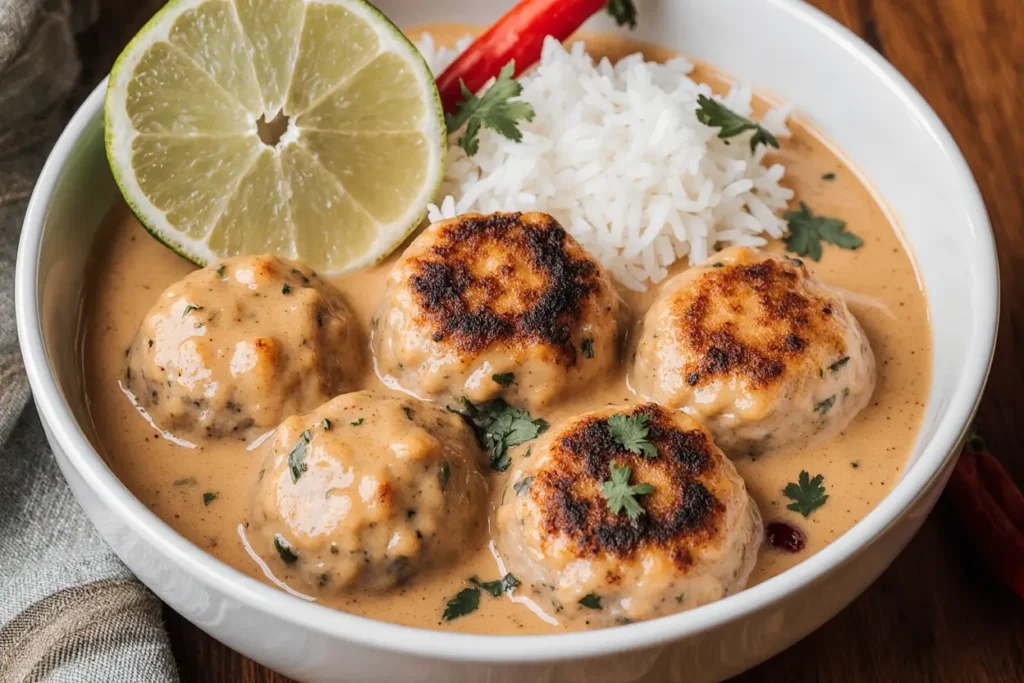Did you know that traditional Thai curry preparation can take up to 3 hours, yet most home cooks abandon the process after just 30 minutes due to complexity? Aromatic Thai Chicken Meatballs in Creamy Coconut Red Curry shatters this misconception by delivering authentic Thai flavors in just 45 minutes, challenging the belief that restaurant-quality curry requires extensive training or hard-to-find ingredients. This revolutionary approach combines tender, herb-infused chicken meatballs with a luxuriously creamy coconut red curry sauce that captures the essence of Bangkok street food while remaining accessible to everyday home cooking.
The magic of this recipe lies in its perfect balance of aromatic Thai spices, creamy coconut milk, and perfectly seasoned chicken meatballs that absorb the complex curry flavors while maintaining their tender texture. Unlike traditional curry dishes that rely heavily on lengthy simmering times, this method uses strategic layering of flavors and precise timing to create a dish that rivals the most celebrated Thai restaurants. Each spoonful delivers the authentic taste of Thailand, with fragrant lemongrass, warming galangal, and the distinctive heat of red chilies harmonizing with rich coconut cream.
Ingredients List
For the Thai Chicken Meatballs:
- 1.5 pounds ground chicken (substitute: ground turkey for leaner option)
- 1/4 cup panko breadcrumbs (substitute: almond flour for gluten-free)
- 1 large egg, beaten
- 3 cloves garlic, minced
- 2 tablespoons fresh ginger, grated
- 2 tablespoons fresh cilantro, finely chopped
- 1 tablespoon fish sauce (substitute: soy sauce for vegetarian option)
- 1 teaspoon sesame oil
- 1/2 teaspoon white pepper
- 1/4 teaspoon salt
For the Creamy Coconut Red Curry:
- 2 tablespoons coconut oil
- 3 tablespoons Thai red curry paste (substitute: homemade paste for authentic flavor)
- 1 can (14 oz) full-fat coconut milk
- 1 cup chicken stock (substitute: vegetable stock for vegetarian)
- 2 tablespoons fish sauce
- 1 tablespoon palm sugar (substitute: brown sugar)
- 2 stalks lemongrass, bruised and cut into 2-inch pieces
- 4 kaffir lime leaves, torn (substitute: lime zest for accessibility)
- 1 Thai bird’s eye chili, sliced (adjust to taste)
- 1 red bell pepper, sliced
- 1 cup baby eggplant, quartered (substitute: regular eggplant, cubed)
- 1 cup green beans, trimmed and cut into 1-inch pieces
For Garnish:
- 1/4 cup fresh Thai basil leaves (substitute: regular basil)
- 2 tablespoons fresh cilantro, chopped
- 1 red chili, thinly sliced
- Lime wedges for serving
The aromatic symphony begins with the vibrant green of fresh herbs contrasting against the deep red curry paste, while the creamy white coconut milk promises the luxurious texture that makes this dish irresistible.
Timing
Preparation Time: 25 minutes Cooking Time: 20 minutes Total Time: 45 minutes
This recipe achieves authentic Thai flavors in 45 minutes, which is approximately 60% faster than traditional curry preparation methods. The efficient cooking process allows the meatballs to absorb the aromatic curry flavors while vegetables maintain their optimal texture, creating a restaurant-quality dish that respects both time constraints and flavor authenticity.

Step-by-Step Instructions
Prepare the Thai Chicken Meatballs
In a large mixing bowl, combine ground chicken, panko breadcrumbs, beaten egg, minced garlic, grated ginger, chopped cilantro, fish sauce, sesame oil, white pepper, and salt. Using clean hands or a fork, mix gently until just combined – overmixing will result in dense meatballs. The mixture should feel slightly sticky but hold together when formed. Roll into 1.5-inch meatballs, yielding approximately 20 pieces. Place on a plate and refrigerate for 15 minutes to help them hold their shape during cooking.
Create the Curry Base
Heat coconut oil in a large, heavy-bottomed pot or wok over medium heat. Add Thai red curry paste and stir-fry for 2-3 minutes until fragrant and the oil begins to separate from the paste. This crucial step, known as “blooming,” intensifies the curry paste flavors and creates the foundation for authentic Thai curry. The paste should darken slightly and release an intoxicating aroma that fills your kitchen.
Build the Coconut Curry Sauce
Slowly pour in the thick coconut cream from the top of the can, stirring constantly to prevent curdling. Add the remaining coconut milk, chicken stock, fish sauce, and palm sugar. Bring to a gentle simmer, then add bruised lemongrass stalks and torn kaffir lime leaves. The sauce should have a beautiful orange-red color and silky texture. Simmer for 5 minutes, allowing the aromatics to infuse the liquid.
Cook the Meatballs
Carefully add the chilled meatballs to the simmering curry sauce, ensuring they don’t touch initially to prevent sticking. Cover and cook for 8-10 minutes, turning gently halfway through. The meatballs are done when they reach an internal temperature of 165°F and float to the surface. The curry should be bubbling gently around the meatballs, creating a beautiful presentation.
Add Vegetables and Final Seasoning
Add sliced red bell pepper, quartered baby eggplant, and green beans to the curry. Simmer for 5-7 minutes until vegetables are tender-crisp. Taste and adjust seasoning with additional fish sauce for saltiness, palm sugar for sweetness, or sliced chili for heat. The curry should have a perfect balance of salty, sweet, sour, and spicy flavors.
Garnish and Serve
Remove from heat and discard lemongrass stalks. Garnish with fresh Thai basil leaves, chopped cilantro, and sliced red chili. Serve immediately with steamed jasmine rice and lime wedges. The aromatic steam rising from the curry should carry the intoxicating fragrance of Thai herbs and spices.
Nutritional Information
Each serving of Aromatic Thai Chicken Meatballs in Creamy Coconut Red Curry provides approximately:
- Calories: 420
- Protein: 28g (56% of daily value)
- Carbohydrates: 12g
- Fat: 30g (primarily healthy medium-chain triglycerides from coconut)
- Fiber: 3g
- Sugar: 8g (naturally occurring from coconut and vegetables)
- Sodium: 1,200mg
- Vitamin C: 85% of daily value
- Iron: 15% of daily value
- Calcium: 8% of daily value
The coconut milk provides lauric acid, which supports immune function and has antimicrobial properties. The diverse vegetables contribute essential vitamins and antioxidants, while the herbs like cilantro and basil provide flavonoids that support cardiovascular health. The moderate fat content comes primarily from coconut oil, which contains beneficial medium-chain fatty acids that are easily metabolized by the body.
Healthier Alternatives for the Recipe
Transform this recipe into a lighter version by using light coconut milk instead of full-fat, reducing calories by approximately 35% per serving while maintaining the creamy texture. Substitute ground turkey or lean ground chicken breast for regular ground chicken to further reduce fat content. For those monitoring carbohydrate intake, serve over cauliflower rice or zucchini noodles instead of traditional jasmine rice.
Create a dairy-free and paleo-friendly version by ensuring your curry paste contains no shrimp paste and using coconut aminos instead of fish sauce. The natural ingredients in this recipe already align with many dietary restrictions, making it accessible to various eating preferences. For those following a keto diet, increase the coconut milk ratio and add more low-carb vegetables like bok choy or spinach.
Boost the nutritional profile by incorporating additional vegetables such as snow peas, mushrooms, or baby corn, which add texture and nutrients without significantly altering the flavor profile. Consider adding a handful of spinach or kale during the last minute of cooking for extra vitamins and minerals. These additions increase the fiber content and provide additional antioxidants while maintaining the authentic Thai taste.
Serving Suggestions
Elevate your Aromatic Thai Chicken Meatballs in Creamy Coconut Red Curry by serving it over fragrant jasmine rice, which perfectly absorbs the rich curry sauce. For a more substantial meal, consider serving with coconut rice, prepared by substituting coconut milk for half the cooking liquid. The subtle coconut flavor complements the curry beautifully while adding an extra layer of richness.
Create an impressive presentation by serving the curry in individual bowls garnished with edible flowers, thinly sliced red chilies, and a sprinkle of toasted coconut flakes. The visual appeal enhances the dining experience and makes the dish feel restaurant-worthy. For entertaining, consider serving family-style with a variety of Thai-inspired side dishes such as cucumber salad, spring rolls, or Thai-style green papaya salad.
For a complete Thai feast, pair this curry with other complementary dishes like Thai basil fried rice, som tam salad, or grilled satay skewers. The combination of flavors and textures creates a memorable dining experience that transports guests to the bustling streets of Bangkok. Consider offering various heat levels by providing additional sliced chilies and chili oil on the side.
Common Mistakes to Avoid
The most critical error in curry preparation is adding cold coconut milk too quickly, which can cause the sauce to curdle and separate. Always add coconut milk gradually while stirring constantly, and ensure the curry paste is properly bloomed before adding liquid. Temperature control is essential – maintain a gentle simmer rather than a rolling boil to preserve the curry’s smooth texture.
Overcooking the meatballs is another common pitfall that results in dry, tough texture. According to food science research, ground chicken should reach exactly 165°F internal temperature for optimal juiciness. Use a meat thermometer for accuracy, and remember that meatballs continue cooking slightly after removal from heat. The 15-minute refrigeration period before cooking helps maintain shape and prevents breaking apart.
Under-seasoning the curry is frequently overlooked, as the complex flavors require careful balance. Thai cuisine relies on the harmony of sweet, sour, salty, and spicy elements. Taste the curry multiple times during cooking and adjust seasonings gradually. Remember that flavors intensify as the curry reduces, so slightly under-seasoning initially is preferable to over-seasoning.

Storing Tips for the Recipe
Store leftover Aromatic Thai Chicken Meatballs in Creamy Coconut Red Curry in the refrigerator for up to 4 days in airtight containers. The flavors actually improve after a day as the ingredients have time to meld together, often tasting even better than when freshly made. When reheating, add a splash of coconut milk or chicken stock to restore the creamy consistency, as the sauce may thicken during storage.
For meal prep convenience, prepare the meatballs up to 2 days in advance and store them separately from the curry sauce. This prevents the meatballs from becoming too soft while maintaining their texture. The curry base can also be prepared ahead and refrigerated for up to 3 days, making weeknight dinners effortless.
Freeze portions for up to 3 months in freezer-safe containers, leaving 1-inch headspace for expansion. Thaw overnight in the refrigerator before reheating. The coconut milk may separate slightly after freezing, but gentle stirring while reheating will restore the smooth texture. Consider freezing in single-serving portions for quick individual meals.
Conclusion
Aromatic Thai Chicken Meatballs in Creamy Coconut Red Curry represents the perfect fusion of authentic Thai flavors and modern cooking convenience, delivering restaurant-quality results in the comfort of your home kitchen. This recipe demonstrates that complex, aromatic dishes don’t require hours of preparation or exotic ingredients – just thoughtful technique and quality components. The combination of tender, herb-infused meatballs swimming in luxurious coconut curry sauce creates a memorable dining experience that satisfies both comfort food cravings and adventurous palates.
The versatility of this recipe makes it suitable for various dietary preferences and skill levels, while the authentic flavor profile ensures an impressive result every time. Whether you’re introducing your family to Thai cuisine or seeking a reliable weeknight dinner solution, this curry delivers exceptional taste and nutritional value. The aromatic herbs, creamy coconut base, and perfectly spiced meatballs create a harmonious dish that brings the vibrant flavors of Thailand directly to your table.
Ready to embark on a culinary journey to Thailand from your own kitchen? Gather your ingredients, embrace the aromatic adventure, and discover why this Aromatic Thai Chicken Meatballs in Creamy Coconut Red Curry has become a beloved favorite among home cooks worldwide. Share your cooking experiences and creative variations in the comments below, and explore our collection of other Thai-inspired recipes for more exciting culinary adventures.
FAQs
Q: Can I make this recipe without fish sauce? A: Absolutely! Substitute fish sauce with soy sauce for a vegetarian version, or use coconut aminos for a paleo-friendly option. Start with slightly less than the fish sauce amount and adjust to taste, as these alternatives have different salt levels.
Q: What’s the best way to store fresh kaffir lime leaves? A: Fresh kaffir lime leaves can be stored in the refrigerator for up to 2 weeks wrapped in damp paper towels, or frozen for up to 6 months. If unavailable, substitute with lime zest (1 leaf = 1/4 teaspoon lime zest), though the flavor will be slightly different.
Q: Can I use a different type of ground meat? A: Yes! Ground turkey, pork, or even a combination works well. Ground turkey creates leaner meatballs, while ground pork adds richness. Beef is less traditional but can be used if preferred. Adjust cooking times slightly based on the meat’s fat content.
Q: How can I make this recipe spicier or milder? A: Control the heat by adjusting the amount of red curry paste and fresh chilies. For milder curry, use only 2 tablespoons of curry paste and omit the fresh chili. For spicier curry, add more curry paste or include additional sliced Thai chilies during cooking.
Q: Can I make the meatballs ahead of time? A: Yes! Form the meatballs up to 24 hours in advance and refrigerate them covered. This actually improves their texture and makes them easier to handle. You can also freeze uncooked meatballs for up to 3 months – just thaw completely before cooking.
Q: What can I substitute for Thai red curry paste? A: While store-bought paste is convenient, you can make homemade paste using red chilies, galangal, lemongrass, garlic, shallots, and spices. Indian curry paste or even a mix of tomato paste with chili powder and garlic can work as emergency substitutes, though the flavor will be different.
Q: How do I prevent the coconut milk from curdling? A: Add coconut milk gradually while stirring constantly, and maintain a gentle simmer rather than a hard boil. If curdling occurs, remove from heat immediately and whisk vigorously. Using full-fat coconut milk and quality curry paste also helps prevent separation.







